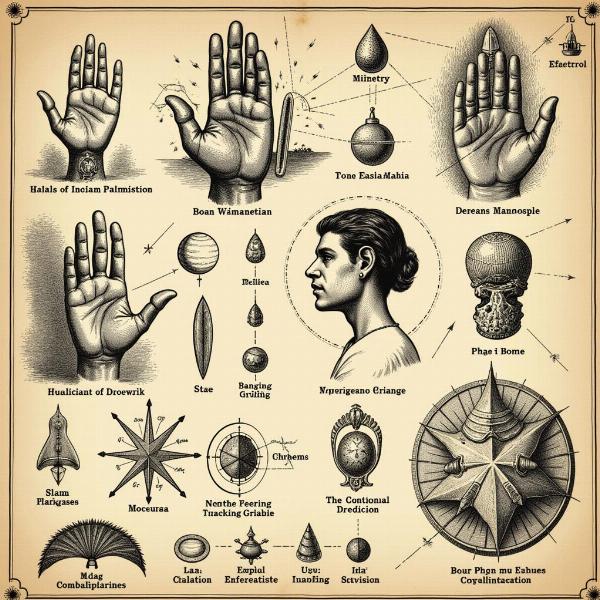Understanding the meaning of “prognostication” in Hindi opens a window into a rich tradition of forecasting and prediction deeply rooted in Indian culture. Prognostication, essentially the act of foretelling future events, finds its resonance in various Hindi words, each carrying nuanced meanings that reflect the diverse approaches to prediction practiced across India. Whether it’s through astrology, palmistry, or other traditional methods, the desire to understand the future has always been a significant part of Indian life. This article explores the various Hindi equivalents of “prognostication,” delving into their cultural context and significance.
Exploring the Hindi Translations of Prognostication
Several Hindi words capture the essence of “prognostication,” offering a glimpse into the varied methods and beliefs surrounding prediction. Bhavishyavani (भविष्यवाणी) is a common and direct translation, emphasizing the act of prophesying or predicting the future. Peshinagoi (पेशीनगोई) also carries a similar meaning, often used in the context of weather forecasting or predicting outcomes of events. Anuman (अनुमान) refers to estimation or conjecture, often based on observation and analysis. While not strictly synonymous with prognostication, it reflects the process of making educated guesses about the future. Bhavishayafal (भविष्यफल) specifically refers to predicting the future based on astrological calculations, highlighting the strong influence of astrology in Indian culture.
Cultural Significance of Prognostication in India
From ancient scriptures to everyday conversations, prognostication is interwoven into the fabric of Indian society. Astrology, in particular, plays a pivotal role, influencing decisions related to marriage, career, and even daily routines. Many Indians consult astrologers before embarking on significant ventures, seeking guidance and reassurance about the future. This deep-rooted belief in the power of prediction reflects a cultural desire to understand and navigate the uncertainties of life.
Methods of Prognostication in Indian Tradition
Indian tradition boasts a wide array of prognostication methods, each with its own unique approach and interpretations. Astrology, palmistry, and dream interpretation are some of the most widely practiced. These methods often draw upon ancient texts and intricate systems of knowledge passed down through generations.
 Traditional Prognostication Methods in India
Traditional Prognostication Methods in India
Prognostication and Modern India
While traditional methods continue to hold sway, modern India also sees a growing interest in scientific forecasting, particularly in areas like weather prediction and economic analysis. However, even in the face of scientific advancements, the cultural significance of traditional prognostication remains strong, demonstrating the enduring fascination with predicting the future.
How Prognostication Shapes Decision-Making
Prognostication, regardless of the method employed, can significantly influence decision-making processes in India. From personal choices to major life events, predictions often provide a framework for navigating uncertainties and making informed decisions.
Conclusion: The Enduring Legacy of Prognostication in Hindi
The meaning of “prognostication” in Hindi extends beyond simple translation, encompassing a rich tapestry of cultural beliefs and practices. Whether through bhavishyavani, peshinagoi, or other related terms, the desire to understand the future remains a powerful force in Indian society, shaping decisions and influencing perspectives on life.
FAQ
- What is the most common Hindi word for prognostication? Bhavishyavani is commonly used.
- Does prognostication only refer to astrology in India? No, it encompasses various methods like palmistry and dream interpretation.
- Is prognostication still relevant in modern India? Yes, it continues to influence decisions alongside modern forecasting techniques.
- What is bhavishayafal? It specifically refers to prediction based on astrological calculations.
- Why is prognostication important in Indian culture? It provides a framework for navigating uncertainties and making informed decisions.
- Where can I learn more about Indian prognostication methods? Numerous books and online resources explore these practices in detail.
- What is the difference between anuman and bhavishyavani? Anuman implies estimation based on observation, while bhavishyavani refers to prophecy or prediction.
Meaning-Hindi.in offers expert translation services for businesses, legal documents, technical manuals, websites, educational materials, and more. We specialize in accurate and culturally sensitive translations between Hindi and other languages. Our team of experienced linguists ensures high-quality, reliable translations tailored to your specific needs. Whether you require business document translation, legal certification, or technical manual localization, Meaning-Hindi.in is your trusted partner. Contact us today for a free quote! Email: [email protected], Phone: +91 11-4502-7584. Let Meaning-Hindi.in bridge the language gap for you!